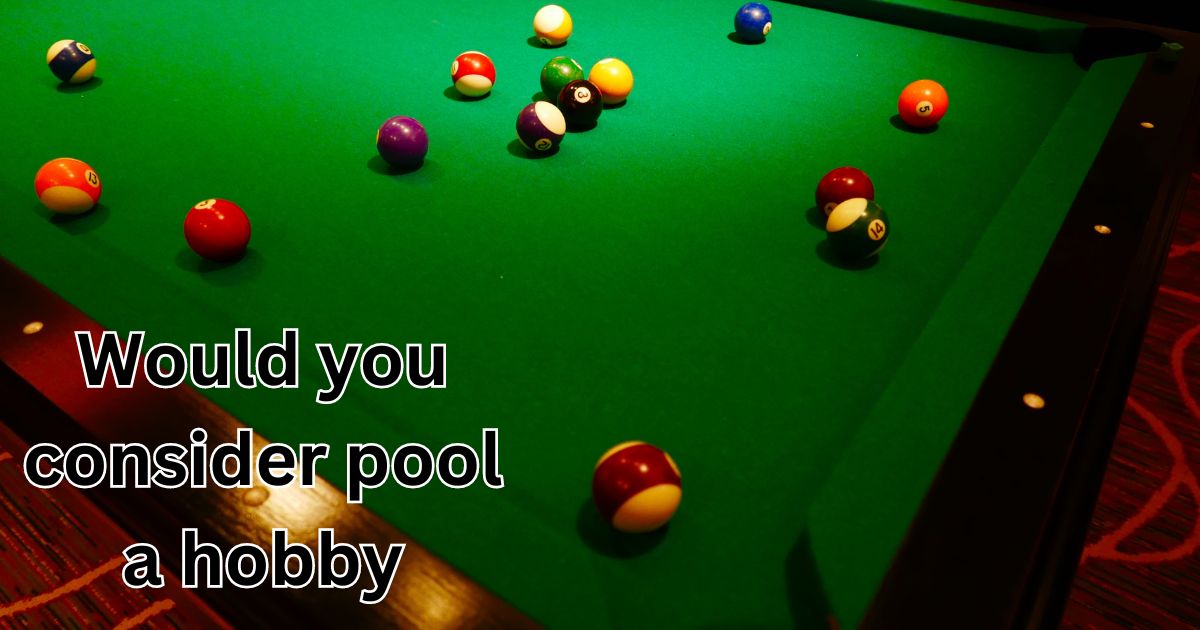A hobby is more than just a pastime; it’s a pursuit that brings joy, relaxation, and personal satisfaction. Hobbies are activities pursued for pleasure, often during one’s leisure time, and they play a crucial role in enhancing our quality of life. Common hobbies include gardening, painting, and playing musical instruments. What sets hobbies apart is their ability to provide a sense of fulfillment and enjoyment, often without the pressures of performance or competition. This intrinsic value is what makes hobbies an essential part of a balanced and happy life.
Pool, also known as billiards, has evolved significantly from its origins. Once a pastime for the elite, it has now become a popular and accessible activity enjoyed by many. Its growth in popularity can be attributed to its social aspects and the skill required to master the game. Whether played casually at a local bar or competitively in tournaments, pool offers a unique blend of strategy, precision, and fun. This article explores the question, Would you consider pool a hobby? by examining its characteristics, benefits, and its role in our lives.
What is Pool?
Overview of Pool
Pool is a cue sport played on a rectangular table with six pockets. The game involves using a cue stick to strike billiard balls, aiming to pocket them into the table’s pockets. Various types of pool games exist, including 8-ball, 9-ball, and straight pool, each with its own set of rules and strategies. The goal is generally to score points by successfully pocketing balls, with the game ending when a specific condition is met. Pool’s appeal lies in its strategic depth and the precision required to play well, making it a challenging yet rewarding game for players of all skill levels.
Pool vs. Billiards
While often used interchangeably, pool and billiards are distinct games. Billiards, typically referring to carom billiards, is played on a table without pockets and involves hitting two balls with the cue to score points. Pool, however, involves pockets and includes various formats such as 8-ball and 9-ball. The differences in gameplay and objectives set these two games apart, with pool being more accessible due to its straightforward rules and emphasis on pocketing balls. Understanding these distinctions helps clarify why pool might be considered a distinct hobby from other cue sports.
The Characteristics of a Hobby
Time Commitment
A defining feature of a hobby is the time commitment it demands. Hobbies often require regular engagement, whether it’s daily, weekly, or monthly, depending on the individual’s interest level. For instance, someone who enjoys painting might spend hours each week on their craft, while a pool player might visit the local pool hall regularly. The time invested in a hobby is usually driven by passion rather than obligation, allowing individuals to pursue their interests at their own pace and in a manner that suits their lifestyle.
Skill Development
Skill development is another hallmark of a hobby. Hobbies typically involve learning and improving over time, which can be highly rewarding. In the case of pool, players develop skills such as precision, strategy, and tactical thinking. Mastery of these skills requires practice and dedication, much like in any other hobby. The process of honing these skills contributes to the sense of achievement and personal growth that defines a fulfilling hobby, providing motivation to continue and improve.
Enjoyment and Passion
The enjoyment and passion for an activity are central to its classification as a hobby. A genuine interest and enthusiasm for the activity distinguish hobbies from mere pastimes. Pool, with its intricate blend of strategy and physical skill, offers a rewarding experience for those who are passionate about the game. The enjoyment derived from playing, whether in a competitive setting or just for fun, fuels the desire to engage with the game regularly, reinforcing its status as a hobby for many players.
Pool as a Hobby
Accessibility of Pool
Pool is widely accessible, contributing to its popularity as a hobby. Many homes and public spaces, such as bars and recreational centers, feature pool tables, making it easy for enthusiasts to play. The availability of pool tables in various settings ensures that people of all backgrounds can engage with the game. Additionally, advancements in technology have made it possible to play virtual pool games online, further increasing its accessibility and allowing enthusiasts to enjoy the game from anywhere in the world. Given these factors, would you consider pool a hobby? The widespread presence of pool tables and the ease of accessing virtual versions highlight how pool fits seamlessly into the category of hobbies, appealing to a diverse audience and providing a fun and engaging pastime for many.
Cost of Playing Pool
The cost of playing pool can vary depending on several factors, including the location and level of play. For casual players, the costs are relatively low, often limited to the rental fees of pool tables at local establishments or occasional purchases of cues and accessories. Competitive players might invest in high-quality equipment and entry fees for tournaments. Despite these variations, the overall cost of engaging with pool is generally manageable, making it an accessible hobby for a wide range of individuals.
Skill Levels in Pool
Pool caters to a broad spectrum of skill levels, from beginners to advanced players. For novices, the game offers a learning curve that is both challenging and rewarding. As players progress, they develop more sophisticated techniques and strategies. Advanced players, who participate in competitive leagues and tournaments, continue to refine their skills and push the boundaries of their abilities. This range of skill levels ensures that pool remains engaging and enjoyable for players at every stage of their journey.
Social Aspects of Playing Pool
Pool as a Social Activity
One of the most appealing aspects of pool is its social nature. Playing pool often involves interacting with friends, family, or even strangers in a relaxed setting. Many people enjoy the game as a way to socialize and unwind, whether it’s at a local bar, a pool hall, or a social gathering. The game’s informal nature encourages conversation and camaraderie, making it an excellent activity for socializing and building connections with others.
Pool Leagues and Tournaments
Pool leagues and tournaments add a competitive dimension to the hobby, fostering community and engagement among players. Joining a local pool league or participating in tournaments provides opportunities to meet other enthusiasts, improve skills, and experience the thrill of competition. These events often attract players of varying skill levels and backgrounds, creating a vibrant community where individuals can share their passion for the game and form lasting friendships.
Pool and Networking
Playing pool can also serve as a valuable networking tool. The social interactions that occur during games, tournaments, and league matches can lead to professional connections and personal relationships. Many people find that their involvement in pool helps them build networks in both their personal and professional lives. The informal setting of pool games often facilitates meaningful conversations and connections, making it an effective way to expand one’s social and professional circles.
Physical and Mental Benefits of Playing Pool
Physical Benefits
Playing pool involves physical coordination and dexterity, which can have several benefits. The act of using a cue stick to strike balls requires hand-eye coordination, fine motor skills, and body control. These physical demands help improve coordination and reflexes, contributing to overall physical health. Regular practice of pool can also enhance posture and strength in the upper body, particularly in the arms and shoulders, making it a beneficial activity for maintaining physical fitness.
Mental Benefits
The mental benefits of playing pool are significant. The game requires strategic thinking, concentration, and problem-solving skills. Players must plan their shots, anticipate their opponent’s moves, and adapt their strategies accordingly. These cognitive demands stimulate the brain and can help improve mental acuity. Additionally, the focus required during play can act as a form of mental exercise, promoting mental agility and resilience.
Stress Relief
Playing pool can be an effective way to relieve stress and unwind after a long day. The focus required during gameplay helps distract from daily worries and provides a sense of relaxation. The social aspect of playing pool with friends or family also contributes to stress relief, as positive social interactions can enhance mood and reduce anxiety. The combination of physical activity and social engagement makes pool a valuable tool for managing stress and promoting overall well-being.
Comparing Pool to Other Hobbies
Pool vs. Other Indoor Games
When comparing pool to other indoor games such as chess or darts, it’s clear that each offers unique benefits and challenges. Unlike chess, which is primarily a mental exercise, pool combines physical skill with strategic thinking. Darts, while also involving precision, lacks the depth of strategy and complex skill development found in pool. Pool’s versatility and the social interactions it fosters distinguish it from other indoor hobbies, making it a unique and engaging activity.
Pool vs. Physical Hobbies
Comparing pool to more physically demanding hobbies like tennis or golf highlights different aspects of each activity. While tennis and golf involve extensive physical exertion and outdoor settings, pool offers a more controlled and less physically intensive experience. Pool players focus on precision and strategy rather than physical endurance, making it accessible to individuals of varying fitness levels. This distinction makes pool a suitable hobby for those who enjoy a mental challenge without the physical demands of other sports.
Pool as a Professional Pursuit
Transitioning from Hobby to Career
For some, pool evolves from a hobby into a professional pursuit. This transition often requires a significant commitment of time and effort to develop advanced skills and gain recognition in the competitive pool scene. Professional players often participate in high-stakes tournaments and exhibitions, showcasing their expertise and competing for substantial prizes. The dedication and passion that drive individuals to pursue pool as a career reflect the deep connection many players have with the game.
Famous Pool Players
Several famous pool players have started their careers as hobbyists before achieving professional status. Legends like Efren Reyes and Shane Van Boening have become renowned figures in the world of pool, known for their exceptional skills and contributions to the sport. Their journeys from amateur enthusiasts to professional champions illustrate the potential for pool to transform from a leisure activity into a distinguished career.
Earning a Living from Pool
Earning a living from pool is achievable for those who excel in the sport. Professional pool players often generate income through tournament winnings, sponsorships, and exhibitions. The competitive nature of the sport, combined with the need for high skill levels, ensures that only the most talented players can make a full-time career out of pool. However, for those who succeed, pool offers the opportunity to turn a passion into a lucrative profession.
The Cultural Significance of Pool
Pool in Pop Culture
Pool has made a significant impact on pop culture, appearing in numerous movies, TV shows, and music. Films like “The Hustler” and “Poolhall Junkies” have portrayed the game’s dramatic and competitive aspects, while pool-themed music and television shows further emphasize its cultural relevance. These representations contribute to the game’s popularity and help maintain its place in popular culture.
Pool in History
The history of pool is rich and varied, tracing back to its origins in 15th-century Europe. Initially played on outdoor lawns, the game evolved into the indoor cue sport we know today. Over the centuries, pool has undergone significant changes, including advancements in equipment and rule modifications. Understanding the historical evolution of pool provides context for its current popularity and highlights its enduring appeal.
Global Popularity of Pool
Pool enjoys global popularity, with variations of the game played in countries around the world. Each region has its own version of the game, such as snooker in the UK and carom billiards in France. The widespread appeal of pool reflects its versatility and the universal enjoyment of its gameplay. Exploring how pool is played and appreciated in different cultures underscores its significance as a global hobby.
Pool as a Family Hobby
Pool as a Multi-Generational Activity
Pool is a versatile hobby that can be enjoyed by people of all ages, making it an excellent multi-generational activity. Families often gather around a pool table to play and bond, creating lasting memories and strengthening relationships. The game’s accessibility and straightforward rules allow family members of different ages to participate and enjoy together, reinforcing its status as a family-friendly hobby.
Teaching Pool to Kids
Introducing children to pool can be a rewarding experience. The game helps develop hand-eye coordination, spatial awareness, and strategic thinking skills. Teaching kids how to play pool also provides an opportunity for quality family time and can instill a lifelong appreciation for the game. By starting with simpler versions of the game and gradually introducing more complex rules, children can learn and grow in their pool-playing abilities.
Also Read: Funny Racing Jokes
Pool Tables at Home
Installing a pool table at home is becoming increasingly popular among families who wish to enjoy the game regularly. Home pool tables provide a convenient and accessible way to play, allowing family members to engage with the hobby at their leisure. The addition of a pool table to a home also enhances the space, creating a recreational area that can be used for socializing and entertaining guests.
Pool and Technology
Digital Pool Games
The rise of digital technology has brought pool to new audiences through online and video game platforms, prompting the question: Would you consider pool a hobby? Digital pool games offer a virtual experience that mirrors real-life gameplay, allowing players to practice and compete from the comfort of their homes. These games often feature realistic graphics and physics, providing an engaging and immersive experience for players who may not have access to physical pool tables. This technological advancement highlights how pool, whether in its physical or digital form, continues to evolve and capture the interest of diverse audiences.
Pool Apps and Resources
Several apps and online resources are available to help pool players improve their skills. These tools offer tutorials, practice drills, and strategy guides, making it easier for players to enhance their game. Apps also provide access to online communities and forums where players can share tips and seek advice. Utilizing these resources can significantly accelerate a player’s learning curve and contribute to their overall development.
Virtual Pool Tournaments
Virtual pool tournaments have become a popular way to compete in the game without geographical constraints. These online events allow players to participate in competitive matches and tournaments from anywhere in the world. Virtual tournaments often feature live streaming and interactive features, creating a dynamic and engaging experience for participants. This development highlights the growing intersection between technology and traditional hobbies.
Pool Etiquette and Sportsmanship
Basic Pool Etiquette
Understanding and practicing basic pool etiquette is essential for maintaining a positive and respectful gaming environment. Key aspects of pool etiquette include respecting the turn of play, not disturbing other players, and handling equipment with care. Following these guidelines ensures that all participants have an enjoyable experience and fosters a sense of community among players.
Fair Play in Pool
Fair play is a fundamental principle in pool, as in any competitive activity. Players are expected to adhere to the rules and conduct themselves with honesty and integrity. Cheating or unsportsmanlike behavior undermines the spirit of the game and can negatively impact the experience for others. Emphasizing fair play helps maintain a positive and competitive atmosphere in pool games and tournaments.
Handling Wins and Losses
Handling both wins and losses gracefully is an important aspect of sportsmanship in pool. Winning with humility and losing with dignity are key to maintaining respect and fostering positive relationships with fellow players. Constructive feedback and a focus on improvement can help players grow and enhance their skills, contributing to a healthy and enjoyable competitive environment.
Challenges and Misconceptions about Pool as a Hobby
Common Misconceptions
Several misconceptions about pool can influence how people perceive the game as a hobby. One common myth is that pool is merely a game of chance rather than skill. In reality, pool requires significant skill, strategy, and practice to master. Addressing these misconceptions helps clarify the true nature of pool and encourages more people to explore it as a hobby.
Overcoming Challenges
Beginners often face challenges when starting with pool, such as mastering the fundamentals and understanding game strategies. Overcoming these challenges involves persistent practice and a willingness to learn. Utilizing resources like instructional videos and seeking advice from experienced players can help newcomers navigate these initial hurdles and develop their skills effectively.
The Learning Curve
The learning curve in pool can be steep, especially for those new to the game. Developing proficiency requires time and dedication, as players must learn techniques, rules, and strategies. While the initial learning phase can be challenging, the rewards of mastering the game and improving over time make the effort worthwhile. Embracing the learning process is crucial for long-term enjoyment and success in pool.
Pool as a Lifelong Hobby
Pool for All Ages
Pool is a hobby that can be enjoyed throughout different stages of life. Whether you’re a child learning the basics or an adult refining your skills, the game offers something for everyone. Its accessibility and adaptability make it a suitable activity for individuals of all ages, allowing people to continue enjoying the game as they grow older.
Continuing to Improve
One of the advantages of pool is the opportunity for continuous improvement. As players advance in skill, they can set new goals and challenges, keeping the game engaging and rewarding. Advanced techniques, strategies, and competitive play offer ongoing opportunities for growth, ensuring that pool remains a stimulating hobby throughout one’s life.
Pool as a Retirement Hobby
For retirees, pool can provide a fulfilling and enjoyable way to stay active and engaged. The game’s social and strategic elements offer opportunities for relaxation and mental stimulation. Many retirees find that playing pool not only provides a pleasant pastime but also helps maintain social connections and physical activity, making it an ideal hobby for this stage of life.
Environmental and Ethical Considerations in Pool
Sustainability of Pool Equipment
The environmental impact of pool equipment is an important consideration for conscientious players. Pool tables, cues, and accessories are often made from various materials, some of which may have environmental implications. Choosing sustainably produced equipment and supporting companies that prioritize environmental responsibility can help mitigate the impact of pool on the environment.
Ethical Production of Pool Accessories
Ethical production practices are essential for ensuring that pool accessories are manufactured responsibly. This includes fair labor practices, safe working conditions, and ethical sourcing of materials. By supporting brands that adhere to ethical production standards, players can contribute to a more responsible and sustainable industry.
Supporting Local Pool Halls
Supporting local pool halls helps promote community engagement and sustains local businesses. These establishments often provide a gathering place for enthusiasts and contribute to the local economy. Patronizing local pool halls ensures that players have access to quality facilities and helps maintain the cultural and social value of the game.
Pool’s Influence on Personal Development
Building Confidence through Pool
Mastering pool can significantly boost self-confidence. The sense of achievement that comes from improving skills and succeeding in games or tournaments enhances self-esteem. As players gain confidence in their abilities, they are more likely to take on new challenges and pursue personal and professional goals with a positive mindset.
Pool and Patience
Playing pool requires patience and persistence. The process of learning techniques, practicing shots, and developing strategies teaches players to approach challenges with a calm and focused attitude. The patience cultivated through pool can be applied to other areas of life, helping individuals navigate difficulties and achieve their goals.
Pool as a Form of Meditation
For many, playing pool serves as a form of meditation. The concentration required to play effectively provides a mental escape from daily stressors. The focused and deliberate nature of the game helps players enter a state of flow, where they are fully immersed in the present moment. This meditative aspect of pool contributes to overall well-being and mental clarity.
Pool Communities and Online Forums
Connecting with Fellow Enthusiasts
Pool communities, both online and offline, offer valuable opportunities for connecting with fellow enthusiasts. Engaging with these communities allows players to share experiences, seek advice, and build relationships with others who share their passion for the game. These interactions can enhance the enjoyment of pool and provide support for continued improvement.
Sharing Tips and Techniques
Online forums and social media platforms serve as valuable resources for sharing tips and techniques related to pool. Players can exchange advice, discuss strategies, and learn from one another’s experiences. This collaborative approach helps individuals enhance their skills and gain new insights into the game.
Finding Local Pool Clubs
Online resources make it easier to find local pool clubs and leagues. These clubs provide opportunities for regular play, social interaction, and participation in organized events. By joining local clubs, players can become more involved in the pool community and enjoy the benefits of consistent practice and competition.
Pool: A Hobby for the Future
Innovations in Pool Equipment
The future of pool involves ongoing innovations in equipment and technology. Advances in materials, design, and manufacturing processes continue to enhance the quality and performance of pool tables, cues, and accessories. Staying informed about these innovations ensures that players have access to the latest advancements and can enjoy an optimal playing experience.
The Evolution of Pool Culture
As pool continues to evolve, so does its culture. New trends and developments in the game shape its future, influencing how it is played and perceived. Embracing these changes and adapting to evolving trends can help players stay engaged and excited about the game.
The Role of Technology in Pool’s Future
Technology will play a significant role in the future of pool, influencing everything from equipment design to virtual play experiences. Innovations such as augmented reality and advanced analytics have the potential to transform how the game is enjoyed and understood. Exploring these technological advancements offers a glimpse into the exciting future of pool.
Conclusion
In conclusion, would you consider pool a hobby? The answer is a resounding yes. Pool is more than just a game; it’s a multifaceted hobby that offers a rich tapestry of experiences and benefits. Whether you’re drawn to its competitive edge, its cultural significance, or its role as a family-friendly activity, pool provides a unique blend of enjoyment and personal growth. From its historical evolution and global popularity to the technological advancements shaping its future, pool continues to captivate enthusiasts across generations. Embracing pool as a hobby not only enhances leisure time but also fosters skills, connections, and a deeper appreciation for this timeless game. As you explore the world of pool, you’ll discover its ability to enrich your life in ways both profound and enduring.










